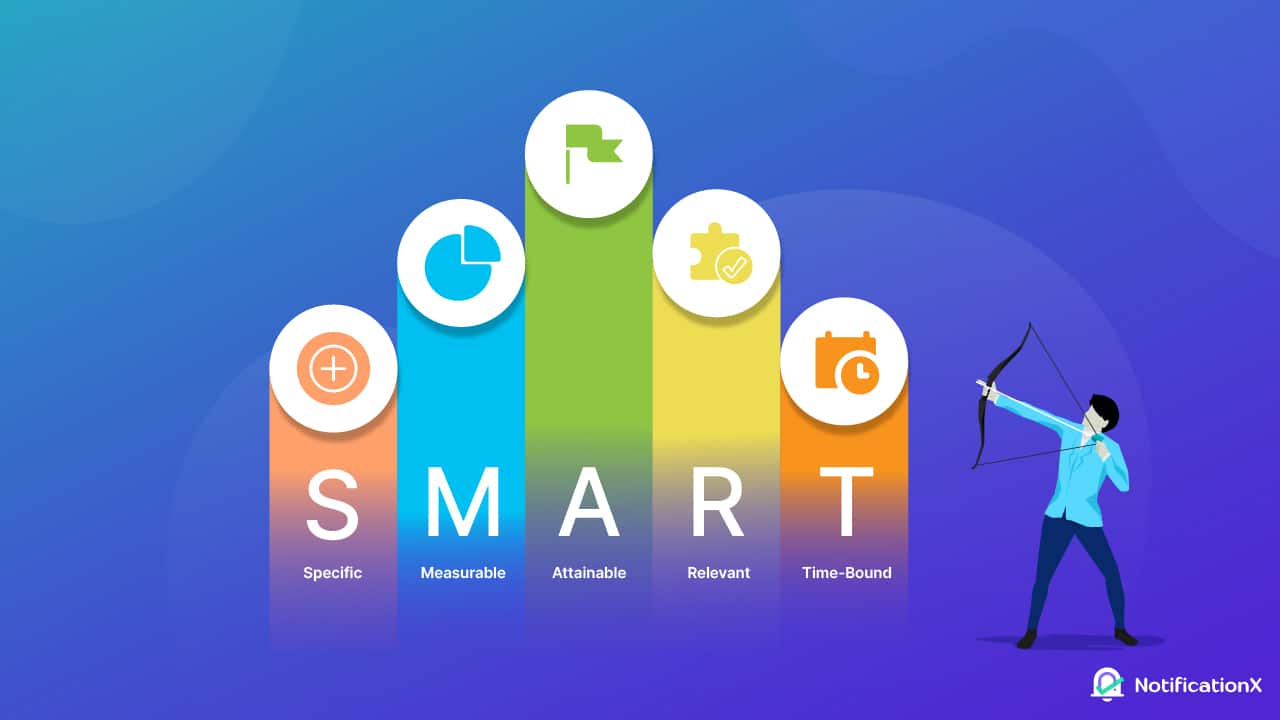Welcome to the realm of SMART goals, where aspirations take shape and accomplishments come to life. In this guide, we will unveil the art of crafting goals that are more than just words on paper; they are the stepping stones to success. Whether you’re aiming for personal growth, professional excellence, or anything in between, join us as we unravel the secrets of goal setting and arm you with real-world examples to inspire your ambitions. It’s time to turn dreams into reality, one SMART goal at a time.

What Are SMART Goals?
SMART goals strategy adheres to a predetermined framework to be achieved. Any kind of objective: personal, professional, financial, and more, can be achieved with this strategy. The SMART goal framework can be used to set both short-term and long-term objectives.
But what do we really mean by SMART? The acronym SMART stands for:
⚡ Specific: Your objectives should be specific and focused on only one thing. Instead of striving to “be a better person,” try putting more emphasis on a specific target at a time, like improving your listening abilities or talking positively with yourself.
⚡ Measurable: The objective must be in line with clear measures, such as saving a certain amount of money or becoming certified in a particular field. This lets you know when your assignment is complete, and the goal becomes more attainable.
⚡ Attainable: This brings us to the next alphabet in the acronym, ‘A’. Realistic goals are more likely to be achieved. You might not get selected for the basketball squad at the Olympics with just a month’s practice, but you could raise your free-throw conversion rate.
⚡ Relevant: A relevant goal is one that is aligned with the broader objectives and priorities of an individual, team, or organization. It answers the question: “Is this goal worthwhile, and does it contribute to our overall objectives?”
⚡ Time-bound: Time-based objectives instill a sense of urgency and promote effective time management. There must be a deadline so that you can schedule your efforts.
Utilizing the SMART goal structure will help you focus your efforts on achieving your objectives and do so with realistic strategies. By structuring your ideas in this way, you can identify potential hurdles and map out a thorough course that considers them.
It can be challenging to create an action plan that works for you. But you can develop goals that will most aid your future by speaking with friends or a life coach. Additionally, it provides you with the social support you need to be accountable and inspired.
Why Use SMART Goals: 3 Unavoidable Facts For You
According to a CoSchedule study, marketing professionals who have a strategy are three times more likely to declare success than those who don’t. This would explain why companies set SMART targets for reasons other than boosting revenue.
🔥 Precision Meets Ambition: SMART goals fuse the power of clear, specific targets with your wildest aspirations.
🔥 Efficiency Redefined: SMART goals streamline your efforts, ensuring every action propels you closer to success.
🔥 Trackable Triumphs: Explore the art of measurable goals and witness your progress unfold, celebrating victories every step of the way.
5 Factors To Keep In Mind Before Setting A SMART Goal Framework
It’s okay if some people have trouble formulating goals. Rest assured that you can improve this ability. It’s possible that your first target is not specific enough or that your measurement method is insufficient. Even a target that falls short of all the SMART requirements still presents a learning opportunity.
You’ll discover what techniques work best for you and which ones to avoid every time you set a goal. The following are 5 suggestions for applying the SMART goal-setting framework:
1. Keep It Simple
It could be difficult to create broad or long-term goals detailed enough to function within this framework. A professional transition or lifestyle change, for instance, can be too hazy to handle all at once. If your long-term goals seem too lofty, divide them into shorter, more manageable objectives to keep you motivated.
3. Know Your Limits
Make sure your goals align with your abilities and values in order to set them. Setting smaller goals along the way could be a smart idea if a task is well beyond your capacity.
4. Write Down Goal Milestones
Ambitions that remain in your brain won’t materialize. You are reminded of why you are working so hard by writing each of the SMART statements down. Additionally, to keep track of your efforts and reduce procrastination, set out your timeframe in a calendar or planner.
5. Learn From Setbacks
Obstacles offer a chance to develop and learn. Spend some time analyzing what went wrong so you can improve. Know when to move on, though. Don’t keep thinking about your difficulty once you’ve learned from it.
How To Format Your Goals Using The SMART Method, With Example
There are no binding rules for utilizing the SMART goal method. Once you know how to utilize it, you won’t miss a single opportunity to use it. Let’s have a look at how you can write effective SMART goals with Smart Methods:
1. SMART Goal For Improving Workplace Communication
You can be the most persuasive team member, with tailored workplace communication, who attains all targets at work by implementing SMART goals. Here is an example.
🌟 Specific: To be more precise, support your remote team in improving communication to speed up work.
🌟 Measurable: Organize team communication using channels, keep track of how frequently they’re used & gauge team output.
🌟 Attainable: We are all tech-savvy and aware of how important communication skills are for a team, so plan to hone those talents.
🌟 Relevant: Since our organization will continue to operate remotely, we must become more adept at interacting online.
🌟 Time-bound: Invite everyone to Slack. Review your analytics in a month and ask everyone how they feel about team communication.
2. SMART Goal For Becoming A Better Leader At Work
You can improve and nourish your leadership qualities and be a better leader at work by setting SMART goals. Here is an example of how to utilize SMART Goals:

🌟 Specific: Improve as a leader so that your team members can depend on you. They should feel confident in you and love working for you.
🌟 Measurable: To gauge how supported your team members feel, survey them once a week. The multiple-choice questions on the standardized form will rate respondents’ levels of satisfaction from one to five. You can also add a part that is open-ended to allow for more detailed comments.
🌟 Attainable: If you have been in this position for six months and your past employment gave you managerial expertise, plan your goal by researching past data.
🌟 Relevant: Make sure you are helping your employees grow and learn as your business expands. Everyone’s tasks will become simpler and more effective if you are a better leader.
🌟 Time-Bound: By the end of this quarter, raise your average scores on each metric by 2 points. This will guarantee that you can lead more effectively when the business takes on new initiatives and hires additional personnel.
3. SMART Goal Example For A Side Business
Smart goals are equally applicable for scaling your business as well. Here is an example of using SMART goals for a side business:
🌟 Specific: Plan to launch a side company selling flowers from your garden. Select plant types.
🌟 Measurable: Allocate at least two hours per day to promoting and organizing your company.
🌟 Attainable: Plan to sell veggies that you grew yourself. If you already have the tools and the know-how, then launch your company.
🌟 Relevant: If you enjoy raising plants and giving them to others, It would also help you supplement your income.
🌟 Time-bound: Begin to develop your marketing strategies and flower cultivation in order to have them ready for sale by July.
4. SMART Goal Example Launching A Successful Online Store
If your long-term plan is to launch a successful online store, then you can utilize SMART goals as well. Here, we have distributed your action plan like this:

🌟 Specific: Launch an online store that sells handmade, eco-friendly home decor items crafted from sustainable materials.
🌟 Measurable: Have a minimum of 50 unique product listings available at the store’s launch.
🌟 Attainable: Research and partner with local artisans who specialize in creating eco-friendly home decor items. Allocate a budget for sourcing materials and creating an initial batch of products.
🌟 Relevant: This goal aligns with the increasing demand for sustainable products in the market and leverages my passion for both entrepreneurship and environmental conservation.
🌟 Time-bound: Launch the online store within 3 months, allowing enough time for product creation, website development, and marketing setup.
We hope that these SMART goal illustrations have motivated you to try making some of your own. After all, setting goals and tracking progress toward them will help you reach them. Without measurements, measuring progress is challenging. If you are unable to determine your current course, you will be unable to determine when and if course correction is necessary. Also, subscribe to our blog to keep getting these kinds of helpful blogs and tutorials.






